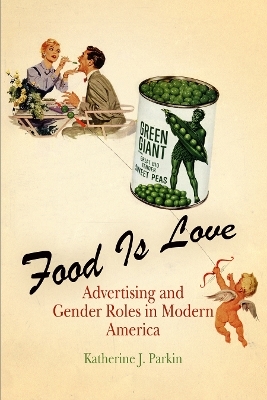
Food Is Love
Advertising and Gender Roles in Modern America
Seiten
2007
University of Pennsylvania Press (Verlag)
978-0-8122-1992-0 (ISBN)
University of Pennsylvania Press (Verlag)
978-0-8122-1992-0 (ISBN)
"An engaging look at how food advertisements from the twentieth and twenty-first centuries have both helped define and played up to the stereotypical gender roles prevalent in American culture."-Library Journal
Modern advertising has changed dramatically since the early twentieth century, but when it comes to food, Katherine Parkin writes, the message has remained consistent. Advertisers have historically promoted food in distinctly gendered terms, returning repeatedly to themes that associated shopping and cooking with women. Foremost among them was that, regardless of the actual work involved, women should serve food to demonstrate love for their families. In identifying shopping and cooking as an expression of love, ads helped to both establish and reinforce the belief that kitchen work was women's work, even as women's participation in the labor force dramatically increased. Alternately flattering her skills as a homemaker and preying on her insecurities, advertisers suggested that using their products would give a woman irresistible sexual allure, a happy marriage, and healthy children. Ads also promised that by buying and making the right foods, a woman could help her family achieve social status, maintain its racial or ethnic identity, and assimilate into the American mainstream.
Advertisers clung tenaciously to this paradigm throughout great upheavals in the patterns of American work, diet, and gender roles. To discover why, Food Is Love draws on thousands of ads that appeared in the most popular magazines of the twentieth and early twenty-first centuries, including the Ladies' Home Journal, Good Housekeeping, Ebony, and the Saturday Evening Post. The book also cites the records of one of the nation's preeminent advertising firms, as well as the motivational research advertisers utilized to reach their customers.
Modern advertising has changed dramatically since the early twentieth century, but when it comes to food, Katherine Parkin writes, the message has remained consistent. Advertisers have historically promoted food in distinctly gendered terms, returning repeatedly to themes that associated shopping and cooking with women. Foremost among them was that, regardless of the actual work involved, women should serve food to demonstrate love for their families. In identifying shopping and cooking as an expression of love, ads helped to both establish and reinforce the belief that kitchen work was women's work, even as women's participation in the labor force dramatically increased. Alternately flattering her skills as a homemaker and preying on her insecurities, advertisers suggested that using their products would give a woman irresistible sexual allure, a happy marriage, and healthy children. Ads also promised that by buying and making the right foods, a woman could help her family achieve social status, maintain its racial or ethnic identity, and assimilate into the American mainstream.
Advertisers clung tenaciously to this paradigm throughout great upheavals in the patterns of American work, diet, and gender roles. To discover why, Food Is Love draws on thousands of ads that appeared in the most popular magazines of the twentieth and early twenty-first centuries, including the Ladies' Home Journal, Good Housekeeping, Ebony, and the Saturday Evening Post. The book also cites the records of one of the nation's preeminent advertising firms, as well as the motivational research advertisers utilized to reach their customers.
Katherine J. Parkin is the Jules Plangere, Jr., Endowed Chair in American History and Political Studies at Monmouth University.
Introduction
1. Advertisers and Their Paradigm: Women as Consumers
2. Love, Fear, and Freedom: Selling Traditional Gender Roles
3. Women's Power to Make Us: Cooking Up a Family's Identity
4. Authority and Entitlement: Men in Food Advertising
5. Health, Beauty, and Sexuality: A Woman's Responsibility
6. A Mother's Love: Children and Food Advertising
Epilogue
Periodical and Archival Sources and Abbreviations
Notes
Index
Acknowledgments
| Erscheint lt. Verlag | 17.1.2007 |
|---|---|
| Zusatzinfo | 25 illus. |
| Verlagsort | Pennsylvania |
| Sprache | englisch |
| Maße | 152 x 229 mm |
| Themenwelt | Sozialwissenschaften ► Soziologie ► Gender Studies |
| ISBN-10 | 0-8122-1992-9 / 0812219929 |
| ISBN-13 | 978-0-8122-1992-0 / 9780812219920 |
| Zustand | Neuware |
| Haben Sie eine Frage zum Produkt? |
Mehr entdecken
aus dem Bereich
aus dem Bereich
wie sich das weibliche Gehirn jetzt verändert und Sie diese neue …
Buch | Hardcover (2023)
Mosaik (Verlag)
CHF 36,90
eine kritische Theorie in 99 Fragmenten
Buch | Softcover (2023)
Campus (Verlag)
CHF 55,95


